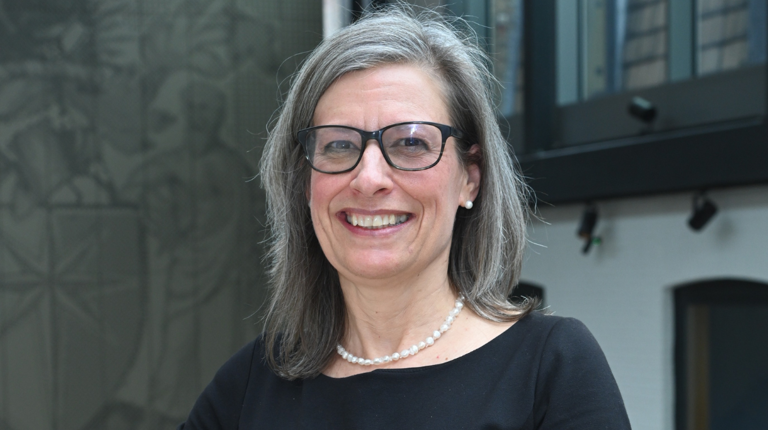After being offered the opportunity to take up a staff grade post, Dr Laura Hipple, RCOG Vice President for Membership and Workforce, had the opportunity to continue working in the specialty she loved (obstetrics and gynaecology), with the financial and geographical stability to settle down, whilst simultaneously being able to develop her career at her own pace.

"I have never ever regretted the decision to step [into] a SAS doctor career."
Following undergraduate training and house officer jobs, Dr Laura Hipple, RCOG Vice President for Membership and Workforce, was undecided on whether to pursue the GP or the O&G route. However, after being given the opportunity to perform a supervised abdominal hysterectomy as an SHO, Laura was "hooked" on O&G.
Laura went on to join the specialty training programme and sit her MRCOG Part 1. It was after completing SHO registrar training and gaining her MRCOG qualification that Laura chose a SAS career. This decision enabled Laura to secure financial and geographical stability, settle down with her family and continue working in O&G.
Laura notes that another advantage of remaining in one consistent place is that it becomes easier to build local connections, which became invaluable in setting up emergency gynaecology pathways when COVID-19 hit.
Within this staff grade post, Laura had a strong job plan and received the support to undertake further training, for instance, in completing her diploma in advanced obstetric scanning. As Laura built on her experience, she recounts that her "job evolved from a sort of registrar level type job, [and] as people gradually retired over the years, … [her] job became more consultant-like during the daytime hours".
Later, Laura was offered the opportunity to be promoted to an associate specialist where she had her own clinics and operating list, and the chance to train others in her areas of special interest (scanning and fertility).
"I was able to develop my interest and it allowed, not only us to develop local service provision, but also to educate staff locally."
As well as regrading as an associate specialist, throughout her career Laura has taken opportunities for development and undertaken many additional clinical and non-clinical roles. These include in roles at her trust as an educational supervisor for both foundation level GP registrars and O&G doctors in training, a trust appraiser for consultant and SAS colleagues, a SAS tutor, a principal investigator, and trust lead for pregnancy loss and antenatal screening. Laura has also had additional roles at the RCOG, formerly as the SAS and LED Lead and now as the Vice President for Membership and Workforce.
"The opportunity to develop the leadership side [of my career] has been absolutely fantastic, albeit somewhat unexpected to find myself talking to you now as a Vice President."
These roles demonstrate the plethora of opportunities available to SAS doctors, not just those who have gone down the traditional trainee to consultant pathway.
"It shouldn't be about job title; it should be about the ability of the person to do the job."
Laura highlights that the new specialist contracts, designed for senior SAS doctors to progress into, reflect that SAS doctors have the potential for other things besides purely service provision, as non-clinical competencies such as leadership management, education and research have to be evidenced.
Therefore, specialist posts offer individuals the opportunity to develop their skills while supporting the trust to meet service need. However, there are currently no specialist posts in O&G.
Laura believes that within our specialty we need to be unlocking the potential of these senior roles and utilising the whole workforce to meet the needs of women and also to support in educating the wider multidisciplinary team.
"We're potentially missing the boat in terms of other ways of developing our medical workforce and providing safe and competent and needed service to the women in our care."
Laura discussed the opportunity of retaining the expertise and skills of doctors who are struggling to continue their training by promoting specialty and specialist roles. SAS careers are hugely attractive but further awareness and education is needed so that the wider workforce recognises different career pathways and appreciates why individuals may choose a SAS career.
"[The specialist roles are] a huge opportunity to capture experience, enthusiasm and indeed useful service at a much more senior level outside the traditional consultant pathway and posts."
Specialist doctors must have at least 12 years' post-graduate experience in England, Wales and Northern Ireland, and 10 years' experience in Scotland, at least six of which must be in the relevant specialty.
Find more information on specialist roles including resources to support doctors considering applying for or working in specialist posts, and employers looking to create specialist posts in their trust.
Support for SAS doctors can vary between trusts. In Laura's own trust, SAS doctors have access to a SAS tutor, SAS advocate and SAS lead. There is a network of SAS doctors across different departments, and the Director of Medical Education (DME) is supportive of developing the SAS voice.
As such, Laura highlights the importance of having access to these support networks and advises aspiring SAS doctors to choose a department/unit where they will be well supported to achieve their career goals (both clinical and non-clinical).
In addition, Laura emphasised the importance of SAS doctors understanding their job plan including the allocated SPA time and study leave entitlement and if there is access to SAS development funding.
The RCOG are very proud that Laura is the first SAS doctor to be a VP of any Medical Royal College. Throughout Laura's term as VP for Membership and Workforce, her key priorities include encouraging SAS doctors to engage with the College and take up RCOG membership, and supporting the wellbeing of our entire O&G workforce: trainees, LEDs, consultants and SAS doctors.
"We need to look at the support we offer right across the workforce and to develop the potential of that workforce in whatever job title they have to provide the best possible care we can for the women and familes that we look after and also for each other in what can be a very challenging, albeit very rewarding specialty."


RCOG Membership
We work to support obstetricians and gynaecologists at a local, national, and international level in our mission to improve the health of women and girls. Find out how you can become part of our membership and the benefits that come with it.

